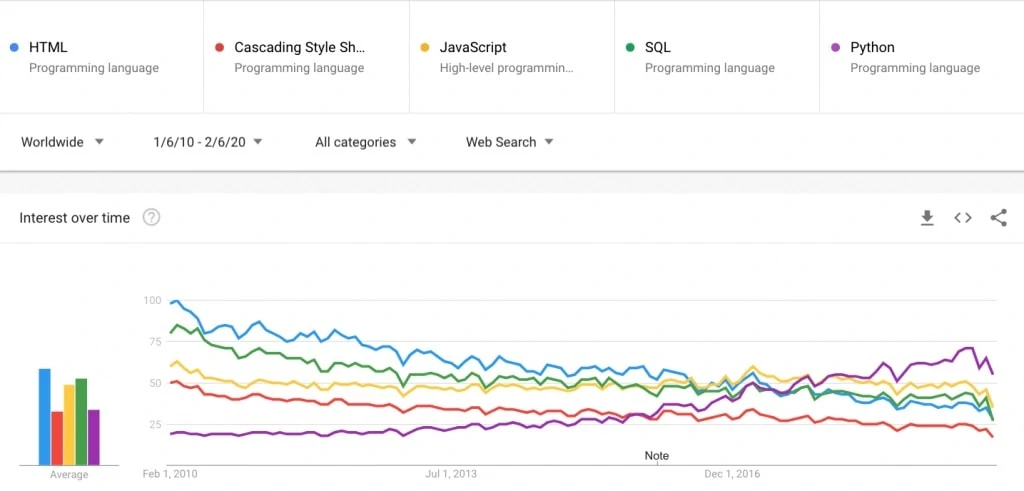“Does digital marketing require coding?”
Marketer with a career crisis
“Does a digital marketing expert need programming skills?”
Digital marketing is getting more complex every year and digital marketers need to cope with the steep learning curve from a wide spectrum of functions. These functions vary from google analytics consulting, search engine optimization, content marketing, user experience design, project management, or budgeting.
As the marketing technology industry evolves at a fast pace, so do the skills required. Digital marketing could be different in the coming years and digital marketers will be even more critical since they are helping organizations make money. In this long list of skills, one more that needs to be added this 2021: Coding.
Read more articles:
JavaScript in Digital Marketing
HTML and CSS in Digital Marketing
Python in Digital Marketing
Coding is the Digital Marketing Skill To Have

Coding is a must-have digital marketing skill this 2021. CXL posted that a T-shaped marketer is an all-rounder possessing a broad width of knowledge with a deep understanding of several areas. This is the key to having a growth mindset.
It’s a harsh reality that digital marketers need to upgrade their skills as frequently as the industry they operate in. Coding skills will give them a competitive edge in the digital job market.
So, why learn to code? Does it have anything to do with digital marketing? Some might think that they are not related. Well, there are different contexts where digital marketers are compelled to learn how to code. Here are 3:
1) “I’m bored with my job. There’s no growth in the company!”
This is one of the most often use cases where digital marketers are compelled to learn how to code. After doing campaign optimization or traffic acquisition for a long time, clicking pause or run in a campaign management system, it’s no surprise that digital marketers are looking to get their feet wet.
Doing Google Ads scripts is a benefit of learning how to code. Digital marketers optimizing Google Ads can find ways to be more efficient. Going through the Google Ads user interface is often just grunt work and learning to code could lessen their optimization workload.
There’s a higher chance of employee retention if companies will give their employees room for growth by letting them learn how to code. Dedicating a portion of the company budget to invest in coding classes could yield massive returns since the in-house digital marketers would be better off in their current roles.
2) “Web developers are taking too long to do my request!”
Web developers take forever to do requests from digital marketers like implement a marketing pixel or change things on a WordPress theme. DMs will be more self-sufficient. It’ll also make them less reliant on web developers for everything.
Google Tag Manager tracking proves the benefit of learning to code. Implementing tracking scripts to websites will be faster. Or setting up A/B tests to web pages on Google Optimize. Learning HTML/CSS/JavaScript and implementing the changes themselves will save them.
Web developers will still be needed to do some heavy lifting for drastic changes, but simple changes like headline copy or call-to-action button color are easy enough to do without web developers.
On a side note, Google Tag Manager serves as the conduit between digital marketers and web developers. It’s a catalyst to break the siloes between the two teams, which leads to the next scenario…
3) “I want to understand web developers and explain what I want to happen!”
Web developers will be in constant war with digital marketers because of spreading their capabilities thin with what’s possible or not on websites. Learning how to code will enable empathy for them.
Enhanced Ecommerce tracking is a great use case. Digital marketers need to understand the dataLayer (which is a JavaScript array) and how it’s being sent to Google Analytics and Google Tag Manager.
Knowing how Revenue, Shipping, Tax, Price, and other costs are being tracked through the dataLayer will save massive time thinking about optimization strategies.
Digital marketers will have an easier time voicing their thoughts to web developers and vice versa. DMs may be oblivious to how metrics are being collected and sent to digital analytics tools. Web developers may not be equipped in the analysis part of the project.
[elementor-template id=”30319″]
“Ok, got it. Which programming language should I start learning?”
There are many programming languages to get started it can be overwhelming. Below are what I’m learning and what I find will be useful for digital marketers.
JavaScript (with HTML and CSS)
These 3 are critical when working on websites. HTML is Hypertext Markup Language that defines the content elements of websites. SEO marketers should feel at home when dealing with HTML because things like H1 tags, Title Tags, Ahrefs, and other meta tags are HTML elements.
CSS is Cascading Style Sheets that gives the look and feel of websites. It describes how the HTML elements should look like. The background colors, font type, font sizes, and other design choices fall into this category. CSS is a markup language together with HTML.
JavaScript is the hardest to learn and this is the actual program language that makes the magic. It gives a website its behavior and becomes interactive.
Digital marketers who specialize in analyzing web traffic and analytics tracking need to know a little bit of JavaScript. Knowing this language is useful especially when Google Tag Manager and the integration of software tools are involved.
Combining these 3 are what makes front-end development possible. There’s a steep learning curve because all 3 should be together to do something great, but the endgame of learning them will be mindblowing.
Python
Considered to be the fastest-growing programming language due to its easy-to-learn syntax. Its popularity has skyrocketed in the last couple of years because of its versatility and many uses.
This multi-purpose programming language is handy when trend forecasting, or when a robust statistical analysis with large datasets is needed. Python can also be used for web development through frameworks like Django or Flask.
The data analysis packages like Pandas are what digital marketers will find useful. The foundation will make its way into machine learning and predictive analytics, which is becoming a craze in recent years.
If digital marketers could tap into the potential of Python, it could help automate tasks like replace Excel spreadsheets into doing anything. Imagine that!
SQL
SQL is Structured Query Language and they are used to query or call datasets from databases. Digital marketers who work in databases will bolster their daily tasks if they know how to do SQL.
This is useful if a digital marketer is working with tools like Google Big Query and other database systems that are outside of the web browser dealing with raw data. Data analysis from sales or the number of products sold will be easier if some SQL knowledge is applied.
Its syntax is very easy to learn. Reading its syntax is as easy as reading a technical document.
“So, where can I find resources to start coding?”
This one is difficult because there’s a multitude of resources out there. Doing a quick Google search will overwhelm people that there’s no reason NOT to learn coding anymore. The list below is what helped me get my feet wet.
YouTube
There are many tutorials on YouTube on any of the prominent programming languages. You’d be lucky to get video tutorials from instructors that would have your preferred teaching style that could help.
freeCodeCamp has a ton of complete courses. Their content would go for hours and cover complete curriculums in one video. Brad Traversy’s crash courses on HTML and CSS helped me get my feet, which led me to buy his course on JavaScript.
If you think you’ll get more value from a more structured curriculum, more content, and has downloadable files to practice, then buying courses will be advantageous.
Udemy
The courses here are inexpensive ranging from $10 to $20 and many of them are on programming. The courses here are more structured. Users will get a glimpse of the curriculum and they can watch video previews on what to expect.
I bought Brad Traversy’s course on JavaScript. I also bought how to do data analysis with Pandas and Python. So far, I’m happy with my purchases and never regretted them.
I suggest watching the previews to see the instructor’s teaching style. You wouldn’t want to pay for a course that’s not helpful. I’ve been in the position where I bought courses and regretted that I didn’t get any value from them.
Skillshare
Skillshare contains amazing classes as well. The platform not only has courses on coding but also has complementary classes like web design or data science. What’s great about Skillshare is they have specialized courses like building a website in Shopify or WordPress. A great way to practice what you learned.
Codecademy and DataCamp
The community also recommends Codecademy and DataCamp for learning. They are online interactive platforms and both are reputable in the industry to learn to program. Both give the ability to sign-up for free.
The prices are steep because they do monthly subscriptions so I suggest checking out the different curriculum and see if they are worth it.
These platforms use an interactive learning environment where the system serves the lesson in digestible chunks and students put the code on the web browser. They can be considered interactive challenges.
I don’t prefer this type of learning because it’s too rigid. A student is forced into answering this ‘quiz’ approach and s/he will not move forward until the correct answer is given. I prefer the open sandbox approach where I need to set up my coding environment on my computer and start coding like a real programmer.
Conclusion: It’s Time to Level Up Your Skills
Some digital marketers mention that they are not technical. This is becoming taboo since the digital marketing space is already technical to be in.
The prolific Simo Ahava has this blog post called “The Myth Of The Non-Technical Marketer”, which posits that marketing functions should thrive for a multidisciplinary approach.
It’s not enough to rely only on soft skills. Though these skills are also very important, a healthy balance of both can go a long way. Digital marketing with a mix of coding skills solves problems in new ways.
A digital marketer doesn’t need to be an expert in programming to succeed in marketing. They will not replace web developers. This is an opportunity to stretch one’s creative muscle and learn from other disciplines.
One day knowing how to code will be as essential as knowing Excel. The baseline skillset in marketing technology will keep on increasing. As technology becomes more advanced at a fast pace, the higher demand for hard skills can’t be ignored.
What’s more important is being aware of one’s knowledge gaps and fill those gaps. Who knows, it could open doors to new opportunities and discover one’s higher calling.
Time to level up!


